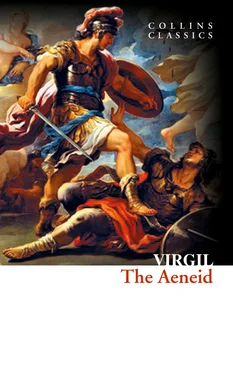Or what, alas! is vanish’d Troy’s offense?
Our hope of Italy not only lost,
On various seas by various tempests toss’d,
But shut from ev’ry shore, and barr’d from ev’ry coast.
You promis’d once, a progeny divine
Of Romans, rising from the Trojan line,
In after times should hold the world in awe,
And to the land and ocean give the law.
How is your doom revers’d, which eas’d my care
When Troy was ruin’d in that cruel war?
Then fates to fates I could oppose; but now,
When Fortune still pursues her former blow,
What can I hope? What worse can still succeed?
What end of labors has your will decreed?
Antenor, from the midst of Grecian hosts,
Could pass secure, and pierce th’ Illyrian coasts,
Where, rolling down the steep, Timavus raves
And thro’ nine channels disembogues his waves.
At length he founded Padua’s happy seat,
And gave his Trojans a secure retreat;
There fix’d their arms, and there renew’d their name,
And there in quiet rules, and crown’d with fame.
But we, descended from your sacred line,
Entitled to your heav’n and rites divine,
Are banish’d earth; and, for the wrath of one,
Remov’d from Latium and the promis’d throne.
Are these our scepters? these our due rewards?
And is it thus that Jove his plighted faith regards?”
To whom the Father of th’ immortal race,
Smiling with that serene indulgent face,
With which he drives the clouds and clears the skies,
First gave a holy kiss; then thus replies:
“Daughter, dismiss thy fears; to thy desire
The fates of thine are fix’d, and stand entire.
Thou shalt behold thy wish’d Lavinian walls;
And, ripe for heav’n, when fate Aeneas calls,
Then shalt thou bear him up, sublime, to me:
No councils have revers’d my firm decree.
And, lest new fears disturb thy happy state,
Know, I have search’d the mystic rolls of Fate:
Thy son (nor is th’ appointed season far)
In Italy shall wage successful war,
Shall tame fierce nations in the bloody field,
And sov’reign laws impose, and cities build,
Till, after ev’ry foe subdued, the sun
Thrice thro’ the signs his annual race shall run:
This is his time prefix’d. Ascanius then,
Now call’d Iulus, shall begin his reign.
He thirty rolling years the crown shall wear,
Then from Lavinium shall the seat transfer,
And, with hard labor, Alba Longa build.
The throne with his succession shall be fill’d
Three hundred circuits more: then shall be seen
Ilia the fair, a priestess and a queen,
Who, full of Mars, in time, with kindly throes,
Shall at a birth two goodly boys disclose.
The royal babes a tawny wolf shall drain:
Then Romulus his grandsire’s throne shall gain,
Of martial tow’rs the founder shall become,
The people Romans call, the city Rome.
To them no bounds of empire I assign,
Nor term of years to their immortal line.
Ev’n haughty Juno, who, with endless broils,
Earth, seas, and heav’n, and Jove himself turmoils;
At length aton’d, her friendly pow’r shall join,
To cherish and advance the Trojan line.
The subject world shall Rome’s dominion own,
And, prostrate, shall adore the nation of the gown.
An age is ripening in revolving fate
When Troy shall overturn the Grecian state,
And sweet revenge her conqu’ring sons shall call,
To crush the people that conspir’d her fall.
Then Caesar from the Julian stock shall rise,
Whose empire ocean, and whose fame the skies
Alone shall bound; whom, fraught with eastern spoils,
Our heav’n, the just reward of human toils,
Securely shall repay with rites divine;
And incense shall ascend before his sacred shrine.
Then dire debate and impious war shall cease,
And the stern age be soften’d into peace:
Then banish’d Faith shall once again return,
And Vestal fires in hallow’d temples burn;
And Remus with Quirinus shall sustain
The righteous laws, and fraud and force restrain.
Janus himself before his fane shall wait,
And keep the dreadful issues of his gate,
With bolts and iron bars: within remains
Imprison’d Fury, bound in brazen chains;
High on a trophy rais’d, of useless arms,
He sits, and threats the world with vain alarms.”
He said, and sent Cyllenius with command
To free the ports, and ope the Punic land
To Trojan guests; lest, ignorant of fate,
The queen might force them from her town and state.
Down from the steep of heav’n Cyllenius flies,
And cleaves with all his wings the yielding skies.
Soon on the Libyan shore descends the god,
Performs his message, and displays his rod:
The surly murmurs of the people cease;
And, as the fates requir’d, they give the peace:
The queen herself suspends the rigid laws,
The Trojans pities, and protects their cause.
Meantime, in shades of night Aeneas lies:
Care seiz’d his soul, and sleep forsook his eyes.
But, when the sun restor’d the cheerful day,
He rose, the coast and country to survey,
Anxious and eager to discover more.
It look’d a wild uncultivated shore;
But, whether humankind, or beasts alone
Possess’d the new-found region, was unknown.
Beneath a ledge of rocks his fleet he hides:
Tall trees surround the mountain’s shady sides;
The bending brow above a safe retreat provides.
Arm’d with two pointed darts, he leaves his friends,
And true Achates on his steps attends.
Lo! in the deep recesses of the wood,
Before his eyes his goddess mother stood:
A huntress in her habit and her mien;
Her dress a maid, her air confess’d a queen.
Bare were her knees, and knots her garments bind;
Loose was her hair, and wanton’d in the wind;
Her hand sustain’d a bow; her quiver hung behind.
She seem’d a virgin of the Spartan blood:
With such array Harpalyce bestrode
Her Thracian courser and outstripp’d the rapid flood.
“Ho, strangers! have you lately seen,” she said,
“One of my sisters, like myself array’d,
Who cross’d the lawn, or in the forest stray’d?
A painted quiver at her back she bore;
Varied with spots, a lynx’s hide she wore;
And at full cry pursued the tusky boar.”
Thus Venus: thus her son replied again:
“None of your sisters have we heard or seen,
O virgin! or what other name you bear
Above that style—O more than mortal fair!
Your voice and mien celestial birth betray!
If, as you seem, the sister of the day,
Or one at least of chaste Diana’s train,
Let not an humble suppliant sue in vain;
But tell a stranger, long in tempests toss’d,
What earth we tread, and who commands the coast?
Then on your name shall wretched mortals call,
And offer’d victims at your altars fall.”
“I dare not,” she replied, “assume the name
Of goddess, or celestial honors claim:
For Tyrian virgins bows and quivers bear,
And purple buskins o’er their ankles wear.
Know, gentle youth, in Libyan lands you are—
A people rude in peace, and rough in war.
The rising city, which from far you see,
Is Carthage, and a Tyrian colony.
Phoenician Dido rules the growing state,
Who fled from Tyre, to shun her brother’s hate.
Great were her wrongs, her story full of fate;
Which I will sum in short. Sichaeus, known
For wealth, and brother to the Punic throne,
Possess’d fair Dido’s bed; and either heart
Читать дальше












